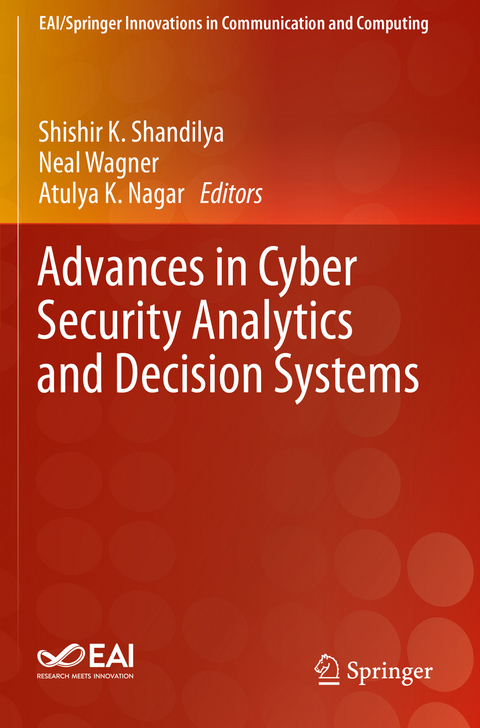
Advances in Cyber Security Analytics and Decision Systems
Springer International Publishing (Verlag)
978-3-030-19355-3 (ISBN)
lt;p>Dr. Shishir Kumar Shandilya currently holds the position of Division Head of Cyber Security and Digital Forensics in School of Computer Science & Engineering, of VIT Bhopal University, India. He is Cambridge University Certified Professional Teacher and Trainer, Senior Member of IEEE-USA and also elected as an executive member of IEEE Industry-Outreach Committee-India. Dr. Shandilya has received "IDA Teaching Excellence Award" for distinctive use of Technology in Teaching by Indian Didactics Association, Bangalore (2016) and "Young Scientist Award" for consecutive two years (2005 & 2006) by Indian Science Congress & MP Council of Science & Technology. He has written seven books of international-fame (published in USA, Denmark and India) He is an active member of over 20 international professional bodies.
Dr. Neal Wagner is a technical staff member in the Cyber Analytics and Decision Systems Group at MIT Lincoln Laboratory. His focus lies in developing problem-solving methods, tools, and techniques that combine computational intelligence and modeling and simulation to create automated/semi-automated cyber decision-making systems. Prior to joining Lincoln Laboratory in 2013, he was at SolveIT Software, where he specialized in the commercialization of bio-inspired computing techniques for supply chain optimization of large organizations. His academic experience includes stints as a faculty member of the Computer Science and Information Systems Departments at Augusta University and Fayetteville State University. Dr. Wagner holds a BA degree in mathematics from the University of North Carolina at Asheville and an MS degree in computer science and a PhD degree in information technology, both from the University of North Carolina at Charlotte.
Prof. Atulya K Nagar is Dean of Science and the Foundation Professor of Computer and Mathematical Sciences at Liverpool Hope University. He is also Head of Department of Computer Science Department. A mathematician by training, Prof. Nagar brings multi-disciplinary expertise in computational science, bioinformatics, operations research and systems engineering to the Faculty of Business & Computer Sciences. He received a prestigious Commonwealth Fellowship for pursuing his Doctorate in applied non-linear mathematics, which he received from the University of York in 1996. Prof. Nagar is an internationally recognised scholar working at the cutting edge of theoretical computer science, applied mathematical analysis, operations research, and industrial systems engineering. The centre of his research expertise lies in his IDS group, which pursues strategic and applied research into advancing applications of engineering, computational and biological systems. The research of the group seeks to contribute to the general body of knowledge and to influence IT practice in systems modelling and planning, scheduling, optimisation, and informatics. One such innovative theme is DNA sequence analysis using sophisticated computational techniques. The work of the group is highly theoretical, and primarily benefits the scientific community, with demonstrable potential for practical applications and relevance to society as a whole. Prof. Nagar has published a substantial number of research papers in reputed outlets such as the IEE and IEEE publications. He has co-edited a volume on Intelligent Systems area and serves on editorial boards for a number of prestigious journals including the International Journal of Artificial Intelligence and Soft Computing, and the Journal of Universal Computer Science. Prof. Nagar was a Conference Chair for the European Modelling Symposium (EMS 2008); currently he is a Conference and TPC Chair for the Developments in E-Systems Engineering (DeSE'09) Conference (www.dese.org.uk); and he serves on International Programme Committees (IPC) for several international conferences. He has been an expert reviewer for the Biotechnology and Biolo
Chapter 1. Introduction.- Chapter 2. Security Design.- Chapter 3. Authentication.- Chapter 4. Authorization.- Chapter 5. Cryptography.- Chapter 6. Virtualization.- Chapter 7. Security principles.- Chapter 8. Malware.- Chapter 9. SQL Injection.- Chapter 10. DoS.- Chapter 11. Worms.- Chapter 12. Virus.- Chapter 13. Malicious Code.- Chapter 14. Intrusion Detection Systems.- Chapter 15. Vulnerability.- Chapter 16. Cyber Laws.- Chapter 17. Cyber Crime.- Chapter 18. Homeland Security.- Chapter 19. Cryptocurrency.- Chapter 20. BitCoin.- Chapter 21. Block chain.- Chapter 22. Phishing.- Chapter 23. Spoofing.- Chapter 24. Cyber War.- Chapter 25. Hacktivism.- Chapter 26. Distributed Denial of Service (DDoS).- Chapter 27. Identity Fraud.- Chapter 28. Honeypot.- Chapter 29. Keylogging.- Chapter 30. Scareware.- Chapter 31. Spam.- Chapter 32. Sponsored Attacks.- Chapter 33. Sneakernet.- Chapter 34. Virtual Militray Technologies.- Chapter 35. Zero Day.- Chapter 36. Intrusion prevention system (IPS).- Chapter 37. Macro virus.- Chapter 38. Wannacry.- Chapter 39. Conclusion.
| Erscheinungsdatum | 21.01.2021 |
|---|---|
| Reihe/Serie | EAI/Springer Innovations in Communication and Computing |
| Zusatzinfo | XII, 145 p. 42 illus., 36 illus. in color. |
| Verlagsort | Cham |
| Sprache | englisch |
| Maße | 155 x 235 mm |
| Gewicht | 254 g |
| Themenwelt | Technik ► Elektrotechnik / Energietechnik |
| Technik ► Nachrichtentechnik | |
| Schlagworte | Distributed Denial of Service (DDoS) • identity fraud • Intrusion Detection Systems • Intrusion prevention system (IPS) • malicious code • Security Design • Security Principles • Virtual Militray Technologies |
| ISBN-10 | 3-030-19355-1 / 3030193551 |
| ISBN-13 | 978-3-030-19355-3 / 9783030193553 |
| Zustand | Neuware |
| Haben Sie eine Frage zum Produkt? |
aus dem Bereich


